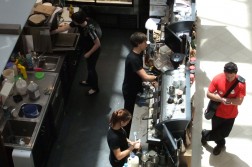To win an Olympic 2,000-metre rowing race requires formidable strength, exceptional endurance and above all, mental confidence. Crew members must have absolute faith in each other's desire. Whether this is achieved through punishing training sessions or incessant reminders of the task ahead, there must be an unrelenting belief in the cause.
Combine this with being citizens of a country where sport is the national theatre, religion and talking point, and you have a recipe for great performances, exultation and tragedy. For how could we really believe that the Olympics are all about participation? A daily medal tally and a lack of media coverage of any 'failures' or losses seems a toxic environment for the competitive and desperate.
We provide our rowers with support at the Australian Institute of Sport so they can focus, almost exclusively, on excellence. We revel in results that place us at the pinnacle of the world stage, yet we are shocked and disgusted when they are tempted by performance-enhancing drugs. We want athletes to be the best they can be, but we want them to be nice too. And humble. And good looking. And not too controversial.
When the Australian women's eight limped over the finish line in last place in their Olympic final, all were exhausted, devastated and unaware of the media barrage that was waiting for them on the landing. No coaches in wait to support them. No debrief to defuse the situation. Sally Robbins had stopped rowing and destroyed the dreams of the other athletes in the boat and they were furious.
So of course they lashed out. Some comments were quite diplomatic, considering that the athlete was not dead or experiencing mechanical or equipment failure. From their point of view, she had failed in the mission, and there was no sympathy for the '110%' she had given before 'hitting the wall'. A former rowing great and Olympic silver medallist wrote an open letter to the media, appalled at Robbins' failure to continue when all were exhausted. All had blood lactic acid levels at a level that would kill the average Josephine. All were at their limit, as they had trained to be.
Robbins declared she had given her all, was paralysed and cannot remember what happened after 1,400 metres into the race. Yet the boat had not stopped. The emergency assistance boat did not come to rescue the rower and, it seems, she remained conscious. So, what could she have done? If this was a repeat performance, why were no strategies implemented to strengthen this weakness? Why did she not seek help to remedy a known problem area in her racing strategy? Were her other team-mates furious with themselves for not supporting her earlier, or for trusting her selection in the first place? Most importantly, will anyone want to row with her in the future?
Donate To New Matilda
New Matilda is a small, independent media outlet. We survive through reader contributions, and never losing a lawsuit. If you got something from this article, giving something back helps us to continue speaking truth to power. Every little bit counts.



